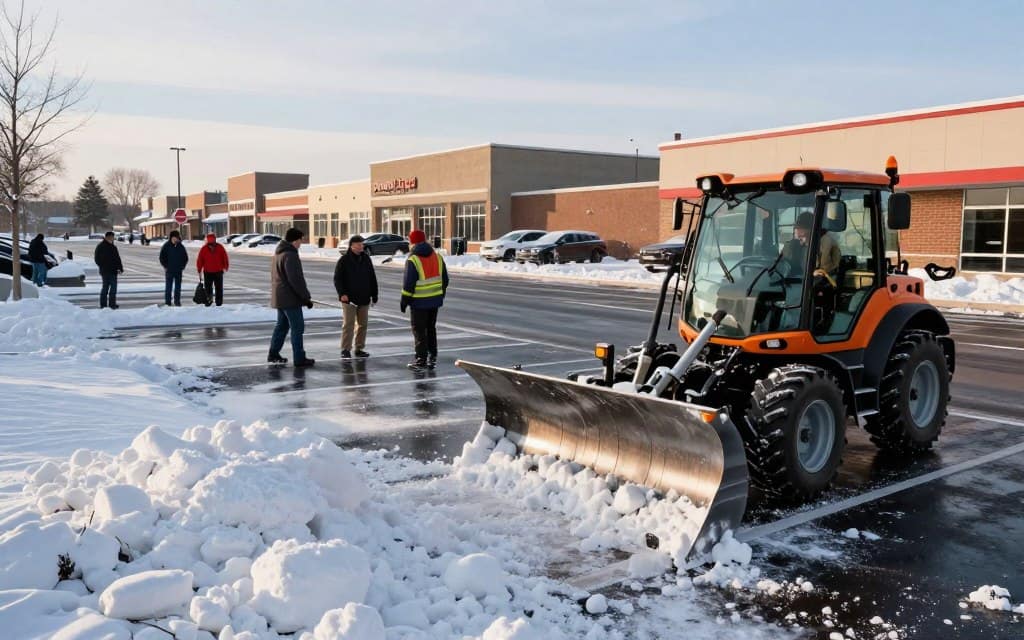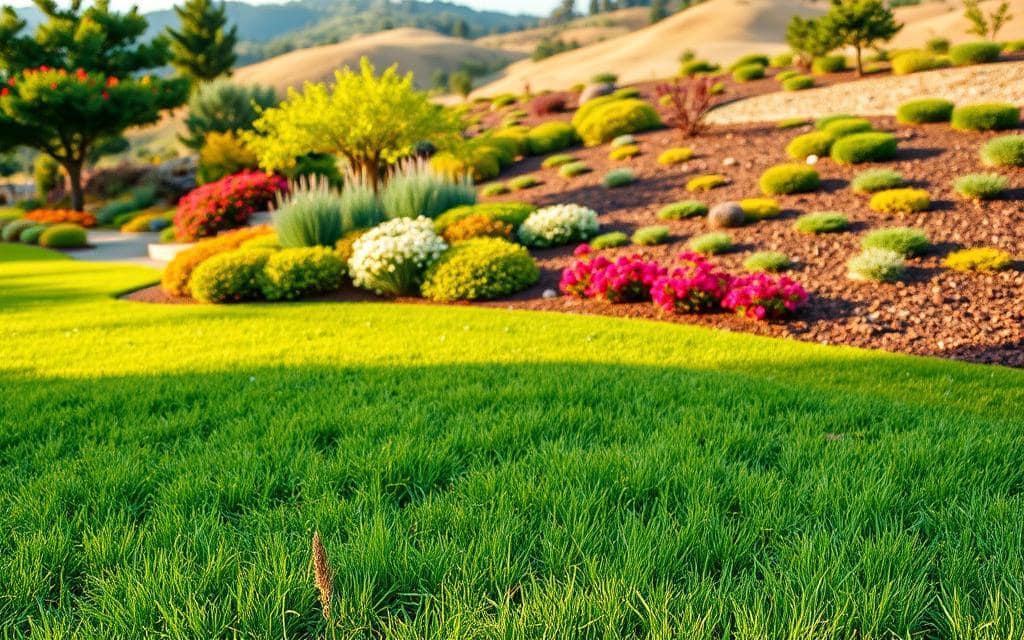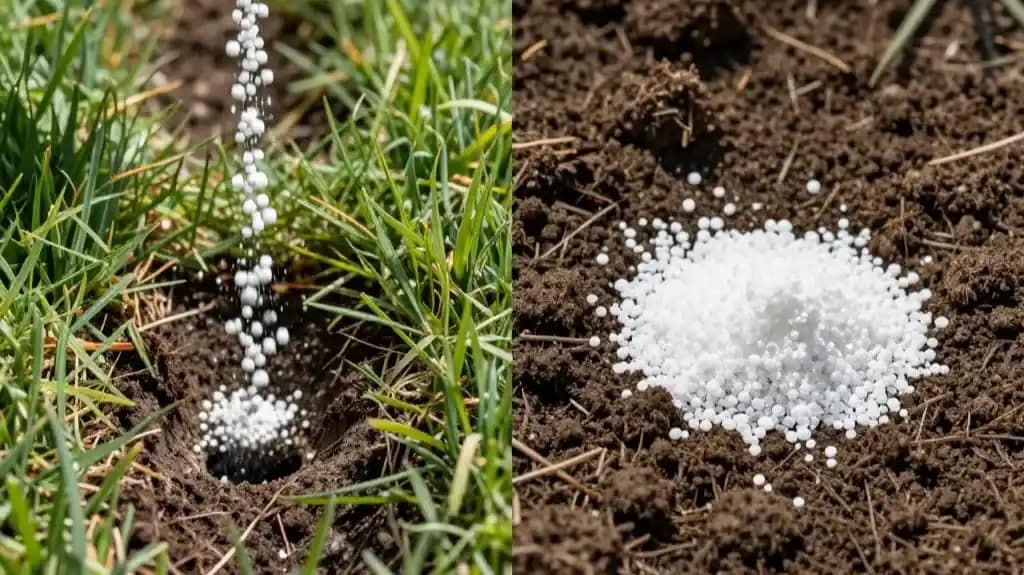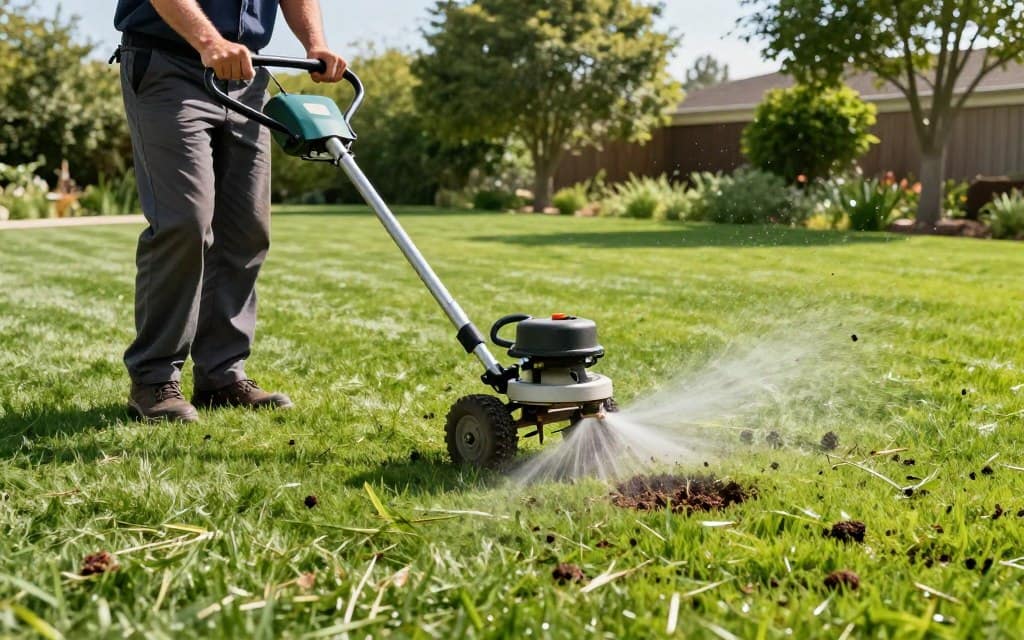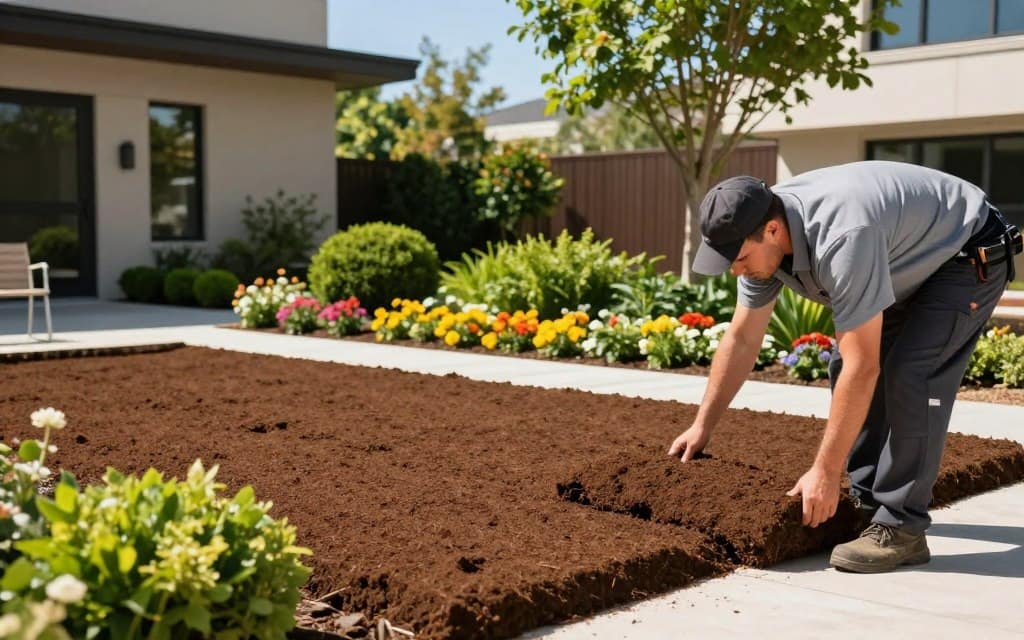Your commercial irrigation system costs will depend primarily on your property size, with small properties (under 1 acre) ranging from $8,000-$15,000, mid-size properties (1-5 acres) from $15,000-$45,000, and large properties (5+ acres) starting at $45,000. You’ll need to factor in smart technology enhancements ($2,500-$6,000), installation labor ($65-195/hour depending on region), and annual maintenance ($2,500-4,000). Understanding the complete cost breakdown will help you make an informed investment decision.
Key Factors Affecting Commercial Irrigation System Costs

When planning a commercial irrigation system, several critical factors influence the total cost of implementation and operation. Your property’s size and shape directly impact the number of sprinkler heads, controllers, and piping required. Soil composition and terrain topography affect system efficiency and determine the necessary pressure ratings and equipment specifications.
You’ll need to take into account your region’s climate patterns and water regulations, as these elements influence water usage and system design requirements. The type of vegetation you’re irrigating will dictate the necessary water distribution patterns and zone configurations. Furthermore, your choice between traditional sprinklers, drip irrigation, or smart irrigation technology greatly affects both initial investment and long-term operational costs. Labor rates in your area and accessibility to the installation site will also play a role in the final project cost.
Base Price Ranges for Different Property Types

Three distinct property categories define the base price ranges for commercial irrigation systems in 2025. You’ll find that costs vary considerably between residential property types and commercial property types, with specialized installations commanding premium pricing.
- Small Commercial Properties (under 1 acre): Expect base costs between $8,000-$15,000, including standard controllers and basic zone coverage
- Mid-Size Commercial Properties (1-5 acres): Base systems typically range from $15,000-$45,000, featuring advanced controllers and multiple zone configurations
- Large Commercial Properties (5+ acres): Starting prices from $45,000-$150,000+, incorporating smart technology, weather sensors, and extensive coverage
- Specialized Installations (golf courses, sports fields): Custom pricing begins at $150,000, requiring sophisticated irrigation engineering and specialized components
Your final cost will depend on your specific property requirements, terrain complexity, and desired system capabilities.
Smart Technology and Advanced Features Pricing
Beyond base system costs, smart technology and advanced features represent significant add-on investments for commercial irrigation systems in 2025. You’ll need to budget $2,500-$5,000 for smart irrigation controllers with weather monitoring capabilities, while soil moisture sensors add another $800-$1,500 per zone.
Tech integration costs include mobile app connectivity ($500-$1,000), automated flow monitoring ($1,200-$2,500), and AI-powered scheduling systems ($3,000-$6,000). Advanced features like pressure regulation valves ($300-$600 each) and remote system diagnostics ($1,500-$3,000) further increase your investment.
These smart technologies typically pay for themselves within 2-3 years through reduced water consumption, lower maintenance costs, and improved environment health. Your ROI accelerates in regions with high water costs or strict usage regulations.
Installation and Labor Cost Breakdown
Regional labor rates for installing commercial irrigation systems will vary considerably in 2025, with higher costs in metropolitan areas averaging $85-125 per hour versus $65-95 per hour in rural locations. You’ll need to factor in the specialized equipment setup costs, which include trenchers, pipe-laying machinery, and pressure testing devices – typically ranging from $2,500-4,000 per project. Your total installation costs will also depend on soil conditions, system complexity, and whether you’re retrofitting an existing system or starting fresh.
Labor Rates By Region
Labor costs for commercial irrigation installation vary greatly across different geographical zones in the United States, with contractors typically charging between $65 and $195 per hour in 2025. You’ll find significant regional labor cost variations based on local market conditions, demand, and cost of living factors.
- Western states like California and Washington command premium rates of $150-195/hour due to strict regulations and high living costs
- Midwest regions average $85-120/hour, reflecting moderate market conditions and steady demand
- Southern states typically range from $65-95/hour, benefiting from lower overhead costs
- Northeast contractors charge $125-175/hour, driven by dense urban development and seasonal demand
Consider these regional differences when budgeting for your commercial irrigation project, as labor typically represents 40-50% of total installation costs.
Equipment Setup Costs
Setting up commercial irrigation equipment requires careful cost allocation across multiple installation components, with typical 2025 projects breaking down into distinct expense categories. You’ll need to contemplate diverse system types and installation methods when planning your budget.
| Component | Labor Hours | Cost Range |
|---|---|---|
| Trenching | 15-25 | $2,500-4,000 |
| Valve Installation | 8-12 | $1,200-1,800 |
| Controller Setup | 4-6 | $800-1,200 |
Your equipment setup costs will differ based on soil conditions, system complexity, and local regulations. Traditional sprinkler systems typically cost less to install than drip irrigation or smart systems. You’ll save considerably by planning your installation during the off-season when contractors offer competitive rates. Most commercial installations require professional crews with specialized equipment, particularly for trenching and main line connections.
Water Conservation Components and Their Costs
You’ll find that modern water conservation components greatly reduce waste while optimizing your commercial irrigation costs in 2025. Smart water meters paired with drip irrigation controls can deliver precise water amounts to specific zones, cutting usage by up to 30%. Your investment in moisture sensor networks will provide real-time soil condition data, enabling automated adjustments that prevent both over-watering and under-watering scenarios.
Smart Water Meters
Smart water meters represent a critical investment in modern irrigation technology, ranging from $200 to $800 per unit depending on their features and connectivity options. These devices improve your smart irrigation system by providing real-time monitoring and water efficiency data.
- Flow monitoring capabilities alert you to leaks and irregularities, potentially saving thousands in water costs
- Mobile app integration lets you track water usage patterns and adjust settings remotely
- Advanced models feature weather-based adjustments that automatically modify irrigation schedules
- Integration with existing building management systems streamlines total facility operations
You’ll find the return on investment typically occurs within 12-24 months through reduced water consumption and labor costs. When selecting a smart water meter, consider compatibility with your current system and future scalability needs to optimize long-term value.
Drip Irrigation Controls
While drip irrigation systems themselves are essential water-saving components, their control units represent a significant investment ranging from $300 to $1,200 for commercial applications. You’ll find that modern drip irrigation controls integrate seamlessly with your property’s smart irrigation network, offering precise water delivery and scheduling capabilities.
The primary drip irrigation benefits include zone-specific programming, soil moisture sensing, and weather-based adjustments. You can achieve up to 95% drip irrigation efficiency when you pair quality controls with proper system design. Today’s units feature smartphone connectivity, allowing you to monitor and adjust watering schedules remotely. Many models also include automatic shut-off valves and flow sensors to prevent water waste and system damage, making them a cost-effective solution for sustainable commercial landscaping.
Moisture Sensor Networks
Modern moisture sensor networks represent an essential investment in water conservation, typically ranging from $2,500 to $8,000 for thorough commercial systems. These sophisticated moisture sensing systems deliver precise, real-time data to enhance your irrigation scheduling and reduce water waste.
Network benefits include:
- Continuous monitoring of soil conditions across multiple zones, with data transmitted directly to your control system
- Automatic adjustments to watering schedules based on actual moisture levels, preventing both under and over-watering
- Integration with weather data and evapotranspiration rates to create smarter watering decisions
- Alert notifications when moisture levels fall outside preset parameters, allowing for quick response to potential issues
You’ll need to factor in installation costs, which vary based on your property’s size and the number of sensors required for ideal coverage.
Maintenance and Operating Expenses
Regular maintenance and operating expenses constitute a significant portion of commercial irrigation system ownership costs in 2025. You’ll need to budget $2,500-4,000 annually for professional inspections, repairs, and system enhancement. Maintenance frequency typically involves quarterly checkups and annual winterization, while daily monitoring guarantees operating efficiency remains ideal.
Your operational costs will include water consumption ($0.75-1.50 per thousand gallons), electricity for pumps ($150-300 monthly), and replacement parts like sprinkler heads, valves, and control unit components. You’ll also need to factor in emergency repair services, which average $200-400 per call. To minimize these expenses, you can implement preventive maintenance schedules and invest in smart controllers that automatically adjust water usage based on weather conditions and soil moisture levels.
Return on Investment and Long-Term Savings
Despite the initial investment, commercial irrigation systems installed in 2025 offer substantial returns through water conservation and reduced labor costs. A thorough cost analysis shows you’ll typically recover your investment within 3-5 years through efficiency gains and operational savings.
Smart commercial irrigation systems pay for themselves within 3-5 years through dramatic water savings and reduced operational expenses.
Key benefits that contribute to ROI:
- Water usage reduction of 30-50% through smart scheduling and precision application
- Labor cost savings of up to 70% with automated controls and monitoring
- Energy efficiency improvements resulting in 25-40% lower utility bills
- Extended outdoor area life due to ideal watering patterns, reducing replacement costs
Modern irrigation systems deliver measurable financial benefits beyond direct cost savings. You’ll see improved property values, reduced insurance premiums, and improved tenant satisfaction. When calculating ROI, consider both immediate operational savings and long-term asset appreciation.
Comparing Different Irrigation System Brands and Models
When evaluating commercial irrigation systems for 2025, you’ll find several leading manufacturers offering distinct advantages in their product lines. Rain Bird’s ESP-ME3 series prioritizes water conservation with smart scheduling, while Hunter’s ICC2 controllers excel in zone management and weather monitoring. Toro’s Evolution series offers extensive brand comparisons, featuring advanced flow sensing and mobile connectivity.
Key model features to take into account include wireless capabilities, flow monitoring, and compatibility with existing infrastructure. You’ll want to examine Weathermatic’s SmartLine controllers for their precision soil moisture sensing, and Baseline’s BaseStation 3200 for its advanced mapping capabilities. Each manufacturer has specialized strengths: Rain Bird focuses on reliability, Hunter on ease of use, Toro on scalability, Weathermatic on water efficiency, and Baseline on data analytics.
Frequently Asked Questions
How Long Does It Typically Take to Install a Commercial Irrigation System?
Your commercial irrigation system’s installation timeline can range from 1-4 weeks, depending on several project factors. You’ll find that property size, system complexity, and soil conditions greatly impact completion time. If you’re working with multiple zones or specialized components, expect longer durations. Weather conditions and permit approvals can also affect your timeline. For most standard commercial properties, you’ll typically see installation completed within 2 weeks.
Can Existing Landscaping Be Preserved During Irrigation System Installation?
Yes, you can preserve existing greenery during irrigation system installation through careful environment protection measures. Using specialized installation techniques like directional boring and trenching alternatives, contractors can work around established plants and trees. You’ll want to make sure your contractor uses root barriers, temporary fencing, and hand-digging methods in sensitive areas. They should also map out pipe routes that avoid major root systems and valuable plantings.
What Permits Are Required for Commercial Irrigation System Installation?
You’ll need several permits before installing a commercial irrigation system. The main requirements typically include a building permit, backflow prevention permit, and water use permit. You’ll also need to submit detailed irrigation plans and obtain local zoning approval. The permit process varies by jurisdiction, but you’ll generally work with your city’s planning department, water authority, and sometimes environmental agencies. Don’t forget to schedule necessary inspections throughout the installation process.
Do Irrigation Systems Affect Property Insurance Rates for Commercial Buildings?
Your commercial property’s irrigation system can impact insurance rates in both positive and negative ways. You’ll find that well-maintained systems may qualify for insurance discounts due to their role in fire suppression and property protection. However, during risk assessment, insurers also consider potential water damage claims from system malfunctions. It’s crucial to document your system’s maintenance and safety features when discussing coverage with your insurance provider to optimize potential benefits.
Can Commercial Irrigation Systems Be Installed During Winter Months?
You can install commercial irrigation systems during winter months, though there are significant considerations. While frozen ground poses challenges, winter installation offers advantages like reduced terrain disruption and typically lower contractor rates. You’ll need to guarantee trenches are dug before ground freeze and components are properly insulated. For ideal system efficiency, it’s best to complete underground work when soil temperatures remain above freezing, typically above 32°F (0°C).


